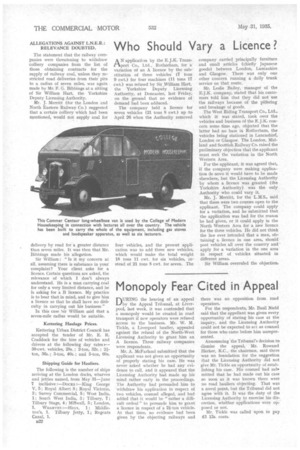Monopoly Fear Cited in Appeal
Page 40

If you've noticed an error in this article please click here to report it so we can fix it.
DURING the hearing of an appeal by the Appeal Tribunal, at Liverpool, last week, it was contended that a monopoly would be created in road transport if new operators were refused access to the business. Mr. W. M. Tickle, a Liverpool haulier, appealed against the refusal of the North-West Licensing Authority to grant him an A licence. Three railway companies were respondents.
Mr. A. McFarland submitted that the applicant was not given an opportunity of properly stating his case. He was never asked whether he had any evidence to call, and it appeared that the Licensing Authority had made up his mind rather early in the proceedings. The Authority had persuaded him to withdraw his application in respect of two vehicles, counsel alleged, and had added that it would be "rather a difficult ordeal" to persuade him to grant a licence in respect of a 2i-ton vehicle. At that time, no evidence had been given by the objecting railways and there was no opposition from road Operators.
For the respondents, Mr. Basil Nield said that the appellant was given every opportunity of stating his case at the inquiry, and the Licensing Authority could not be expected to act as counsel for those who came before him unrepresented.
Announcing the Tribunal's decision to dismiss the appeal, Mr. Rowand Harker, K.C., the chairman, said there was no foundation for the suggestion that the Licensing Authority did not give Mr. Tickle an opportunity of establishing his case. His counsel had sulm, mitted that he had made out his case so soon as it was known there were no road hauliers objecting. That was a novel point, but the Tribunal did not agree with it. It was the duty of the Licensing Authority to exercise his discretion, whether applications were opl" posed or not.
Mr. Tickle was called upon to pay 13s. costs.




































































































